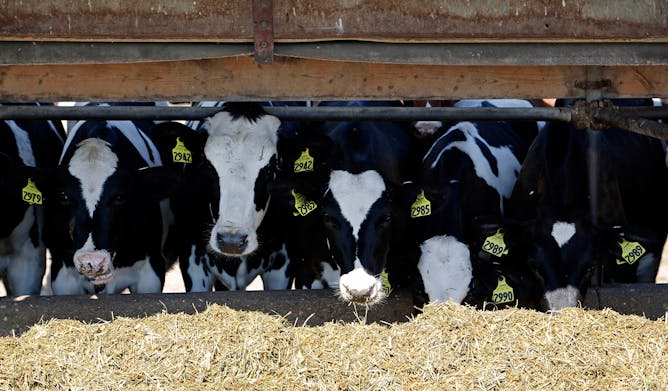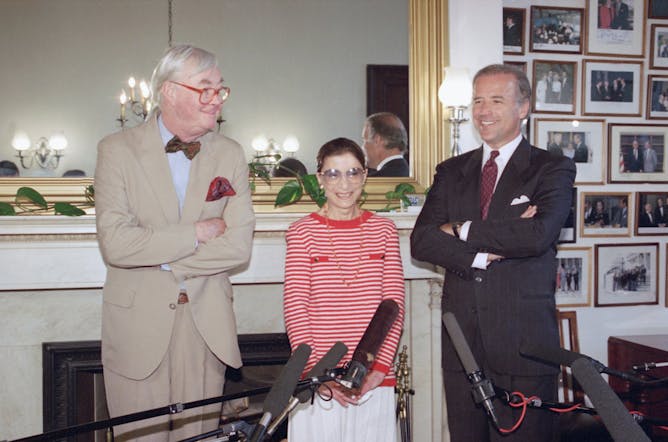Editor's note
|
|
More than two years ago, candidate Donald Trump promised to renegotiate NAFTA – or scrap it. On Sept. 30, President Trump came closer to fulfilling that pledge after Canada agreed to sign on to the deal he made with Mexico in August. But amid the hoopla, has anything really changed? Colorado State trade expert Amanda Countryman sees three key revisions that distinguish NAFTA 2.0 from its predecessor.
With ongoing news of high-profile men being accused of sexual assault, it’s important to take a step back and remember that not all men commit sex crimes against women, argues trauma psychologist and professor of psychiatry Joan Cook. She offers some perspective by taking us deep into the numbers.
Justice Ruth Bader Ginsburg’s work as an attorney in the 1970s – before she was named to the Supreme Court – transformed that court’s approach to women’s rights. And, as the country is embroiled in the latest bitter battle over how those rights should be interpreted, Jonathan Entin of Case Western Reserve University School of Law writes that the modern skepticism about sex-based policies stems in no small way
from Ginsburg’s trailblazing efforts.
|
Bryan Keogh
Economics + Business Editor
|

|
|
Top stories
|

More milk from these Wisconsin dairy cows may find its way to Canada under the new trade deal.
Reuters/Darren Hauck
Amanda M. Countryman, Colorado State University
Canada, the US and Mexico are about to rip up the 25-year-old NAFTA and replace it with something new. But how new?
|

Most men are not sexual predators and enjoy the closeness of the people they love.
Pink Panda/Shutterstock.com
Joan Cook, Yale University
In the wake of the #MeToo movement and women finally feeling free to discuss having been sexually assaulted, it may seem like all men are predators. A trauma psychologist says this is far from true.
|

Judge Ruth Bader Ginsburg paying a courtesy call on Sen. Daniel Patrick Moynihan, D-N.Y., left, and Sen. Joseph Biden, D-Del., in June 1993, before her confirmation hearing for the Supreme Court.
AP/Marcy Nighswander
Jonathan Entin, Case Western Reserve University
Before she became a Supreme Court justice, Ruth Bader Ginsburg’s work as an attorney in the 1970s fundamentally changed the court’s approach to women's rights and how we think about women – and men.
|
|
Our podcast "Heat and Light" on 1968 speaks with Arizona State University’s Donald Critchlow about how it was the year when Richard Nixon won the White House — which Republicans would control for most of the next two decades.
    
|
Science + Technology
|
-
Daniel Piatkowski, University of Nebraska-Lincoln
Autonomous cars and people-centered communities are mutually exclusive, writes a cyclist and transportation scholar.
-
Anne Tucker, Georgia State University; Charlotte Alexander, Georgia State University
Artificial intelligence and data analytics are transforming the practice of law.
|
|
Environment + Energy
|
-
Alycia Drwencke, University of California, Davis; Cassandra Tucker, University of California, Davis; Theresa Pistochini, University of California, Davis
Dairy cows are sensitive to heat, so farmers cool them down with sprinklers and fans. Researchers are designing better, more efficient systems to keep cows comfortable through hot California summers.
|
|
|
|
|
|
|
|
From our International Editions
|
-
Lisa Kane, University of Cape Town
Various attempts have been made to complete Cape Town's Foreshore Freeway scheme. A new approach is needed.
-
Mohammed Al-Mosaiwi, University of Reading
New research shows that people with depression use words such as 'always', 'nothing' or 'completely' more often than others.
-
Blayne Haggart, Brock University
The relief that the U.S. didn’t make things even worse for Canada in the new NAFTA should be tempered by the realization that the moment of reckoning hasn’t passed; it’s only been postponed.
|
|
|
|
| |
| |
|
|